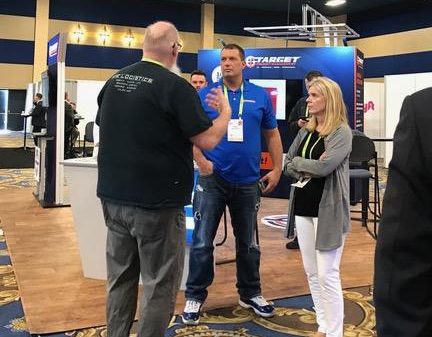Several Pittsburgh technology companies traveled to Las Vegas this week to participate in the massively-attended annual Consumer Electronics Show as both exhibitors and trend-spotters.
Covestro’s Pittsburgh operations took part in CES 2019 to highlight the company’s work in helping startups choose the best materials for their physical products. Andreas Brandt, vice president of marketing for electronics, electrical and appliances and polycarbonates in Covestro said that while tech startups are often strong in the technical aspects, like programming and engineering, they tend to lack understanding in choosing materials.
Joel Matsco, senior marketing manager of polycarbonates and electronics and appliances at Covestro, has been attending CES on and off for about 10 years.
“Initially it was just as trend spotting and getting in tune with the flow of the industry, but more recently it’s been to identify key topic areas where materials have major impact to the design of electronics of the future,” said Matsco.
This year, Covestro hosted two startups that it worked with on material decisions at the company’s CES exhibit— Pittsburgh-based KerfCase, which creates wireless smartphone charging pads; and Boston-based Embr Labs, which creates smart bracelets that regulate body temperature.
Matsco said major trends at CES this year included autonomous vehicles, embedded electronics, integrated LED lights, and, perhaps most prominently, an increase in 5G. He saw an interest in 5G last year, but said this year’s showcase really ignited the possibilities of what it can do.
“This year is a confirmation in that trend,” said Matsco. “We are now into a phase where the industry is really getting to work. Now that the protocols for 5G have been established to a degree, it’s a shift in how we realize this in day-to-day devices.”
J.J. Xu, founder of Talk Me Up, said she also saw trends in robotics, augmented reality and virtual reality and artificial intelligence at CES this year. Xu attended this year’s CES with a group of student startups based out of Carnegie Mellon University, University of California Berkeley, and Massachusetts Institute of Technology.
Talk Me Up, an artificial intelligence-based software company that provides communication training to marginalized populations, launched its beta product about four months ago and is piloting its service in five organizations. The startup plans to release its new AI system in about six months.
Xu said CES’s international reach made the showcase an ideal networking environment, and she met and received feedback from potential customers.
Mike Wagner, president and CEO of Pittsburgh’s Target Freight Management, agreed, saying his company attends a great deal of trade shows, but CES is unique in the number of huge companies taking part. Wagner debuted Target Freight Management’s new technology, the dimensionalizer —a tool that measures freight using an infrared camera— before sending it to CES.
“It’s almost like a car show for technology, because everyone is here to look at everything,” said Wagner. “The booths are amazing.”
For others, like self-driving vehicle company Aurora, parts of CES literally are a car show.
Aurora announced its involvement in PAVE, or Partnership for AV Education, which was launched at the show. PAVE, made up of industry, nonprofit and academic institution members, focuses on educating the public and policymakers about autonomous vehicles.
“Part of our responsibility in delivering the benefits of self-driving technology is to connect with and listen to our community, building a foundation of transparency and trust,” said an Aurora spokesperson. “We are a founding member of PAVE because we share the belief that public understanding of the potential and reality of self-driving vehicles is essential to fulfilling the potential.”
Other Pittsburgh tech companies, or companies with Pittsburgh operations, that took part in CES include Hibersense, IAM Robotics, Argo AI, Comcast and AlphaLab Gear.

